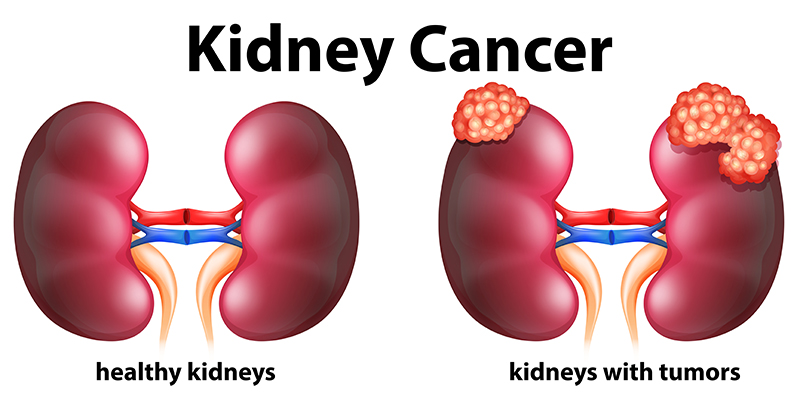
Table of Contents
What is kidney cancer?
Kidney cancer is a type of cancer that grows in the cells of the kidneys. It is relatively common in Nigeria. Treatments for kidney cancer are getting better and the chances of surviving are improving, especially if the cancer is diagnosed early.
Kidney cancers usually grow as a solid tumour, or lump, in one kidney, although it is possible to have one or more tumours in both kidneys. They start small but grow larger, eventually spreading to other parts of the body.
The cancer usually grows in the part of the kidney that processes blood. These tumours can be aggressive and fast growing. Sometimes the cancer will grow in the lining of the kidney or ureter (the tube that takes urine from the kidney to the bladder). This type of kidney cancer is unlikely to spread.
Kidney cancers that are found early can usually be cured, although a lot people still die from kidney cancer every year inNigeria.
What are the types of kidney cancer?
The types of kidney cancer are named after the type of cell where the cancer develops. Often kidney tumours can be formed of more than one type of cancer.
The most common type is called renal cell cancer or renal cell carcinoma. This starts in the cells in the lining of the tubules, part of the kidney’s filtering system.
The other type is called urothelial carcinoma (or transitional cell carcinoma). This grows in the central area of the kidney where urine collects before it is passed through to the bladder.
A rare type of kidney cancer that affects children is called Wilms tumour.
What are the symptoms of kidney cancer?
Often there are no symptoms of kidney cancer until it is quite far advanced. Common symptoms include:
- blood in the urine
- a lump in the tummy or side
- pain in the side or lower back that does not go away
- losing weight quickly for no obvious reason
- feeling very tired all the time
- a fever
- low iron in the blood or anaemia
All of these symptoms could be due to something other than kidney cancer. But if you are worried, see your doctor.
What causes kidney cancer?
Kidney cancer is more common in older people. The average age to be diagnosed with kidney cancer is 55. It isn’t usually seen in children and is more common in men than in women.
Some things increase your risk of kidney cancer, including:
- smoking
- being obese
- having high blood pressure
- having kidney failure
- having a close family member who has had kidney cancer
- having an inherited condition such as Hippel-Lindau disease, hereditary papillary renal cell carcinoma or Birt-Hogg-Dubé syndrome
- being exposed to certain chemicals
How is kidney cancer diagnosed?
If your doctor suspects kidney cancer, they will order urine tests to check for blood in your urine, blood tests and imaging such as a CT scan, MRI, ultrasound or x-ray to examine the kidneys. Sometimes you might also have a biopsy, where a small sample of tissue is removed to be examined in a laboratory.
If you have kidney cancer, your doctor will refer you to a specialist for treatment.
Natural cancer treatment for kidney cancer.
The best type of treatment will depend on the type of kidney cancer you have, where it is, and how far it has spread (known as its stage).
If the cancer is found early, conventionally, the main treatment is surgery to remove the tumour. Sometimes other techniques are used to kill the cancer, such as radiofrequency ablation (which uses high-energy radio waves to heat the tumour) or stereotactic body radiation therapy (which uses radiation to kill the cancer).
Sometimes, your specialist will recommend no treatment but will monitor the cancer very closely. This is known as ‘active surveillance’.
If the kidney cancer is more advanced and has spread, you will have a range of different treatments to control the cancer and manage any symptoms. These may include medicine that targets the cancer cells (targeted therapy), radiotherapy or medicine to help your own immune system fight the cancer (immunotherapy). Chemotherapy is rarely used for kidney cancer.
Natural cancer treatment Read more
